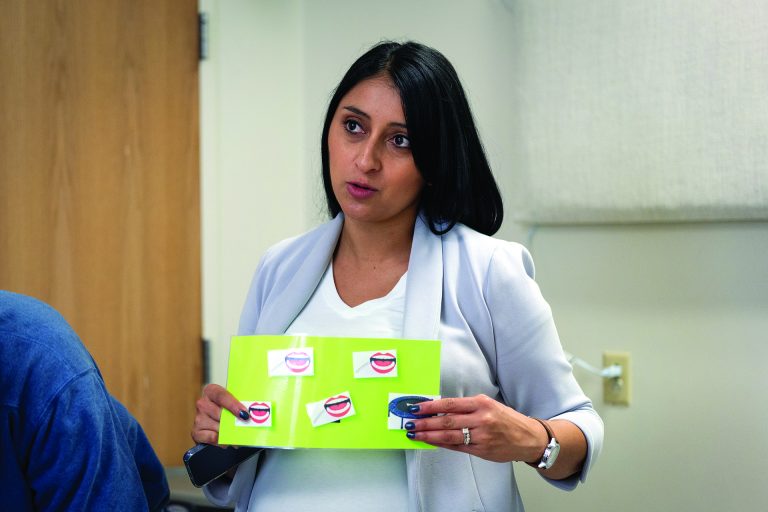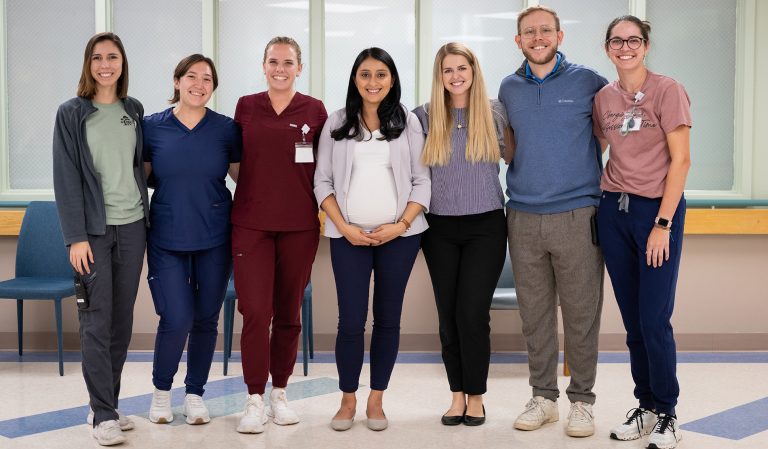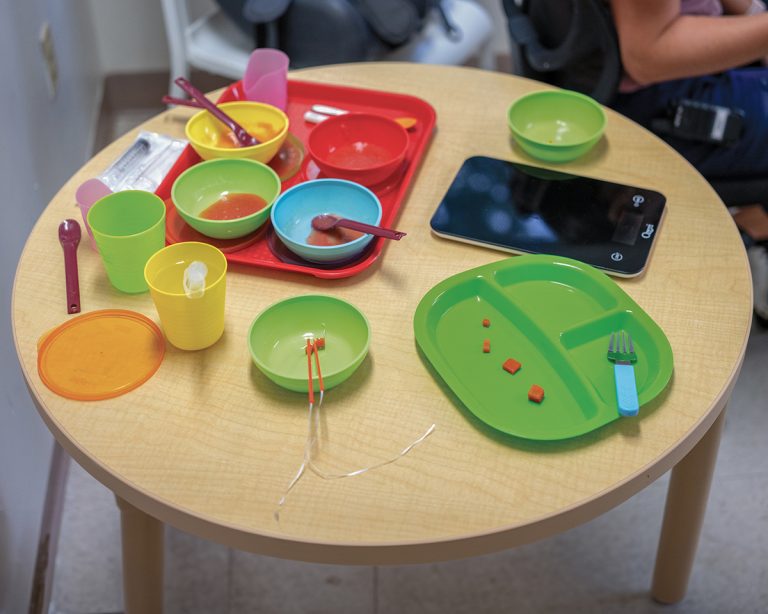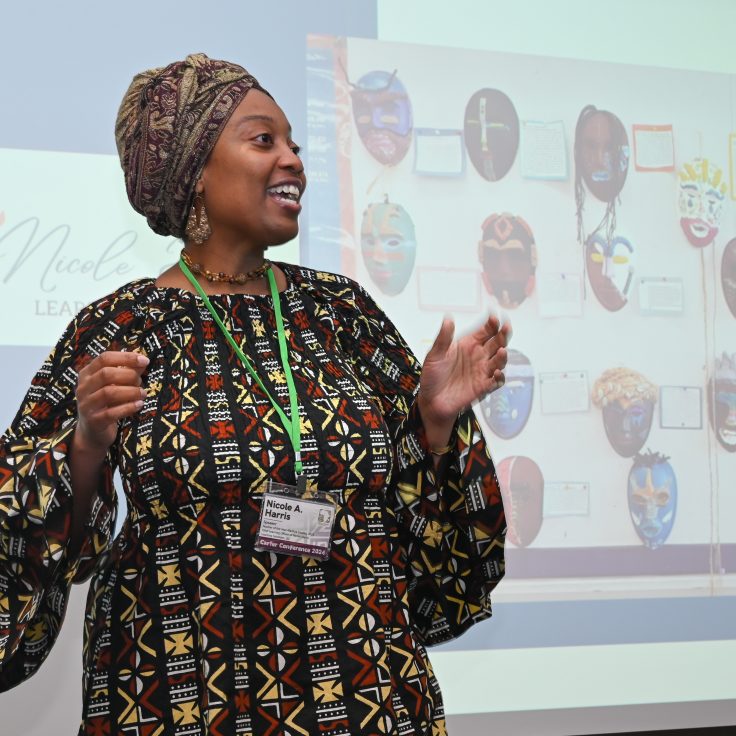UF Psychology’s Vivian Ibañez tackles pediatric feeding disorders with cultural compassion
Vivian Ibañez understands the power of food. It’s a vital element for survival, but it’s more than mere sustenance. It serves as a cultural anchor, shaping identity and fostering a sense of belonging. Immigrants, including Ibañez, often find food to be a stabilizing force, offering a powerful pathway back to their roots.
“Food is a big reminder of where we come from,” Ibañez said. “It’s one of our strongest links to home.”
Despite the universal importance of food, the intricacies of eating are often overlooked. Proper nourishment is not a given for everyone, especially for children with severe feeding challenges. These disorders, surprisingly common among children, can have profound impacts on physical and emotional development if not addressed.
Decoding Behavior
Ibañez, a research assistant professor in the Department of Psychology, specializes in navigating the complex challenges faced by families grappling with feeding disorders. As part of her role, she oversees a pediatric feeding disorders clinic at the Florida Autism Center, a division of BlueSprig, in collaboration with the UF Health Center for Autism and Neurodevelopment.
To tackle these challenges, Ibañez and her colleagues employ applied behavior analysis, a branch of natural science rooted in the belief that behavior is influenced by the environment, and modifying it is key to behavioral change.
Everything is backed by data. “That’s part of why I fell in love with this field — because it’s based on objective decisions,” Ibañez said. “I spend all day looking at the graphs and data points,” she said. Ibañez and her team develop assessments of each patient’s behaviors, linking that information to individualized treatment plans.
Ibañez stresses that while feeding disorders and eating disorders may sound similar, they’re quite distinct. Eating disorders typically involve body image issues, whereas children with feeding disorders exhibit food refusal or selectivity for other reasons.

These families are not just dealing with picky eaters. Many of Ibañez’s patients are born prematurely, lacking the fully developed anatomy required for coordinated feeding processes. This early difficulty in eating can lead to aversions, setting the stage for future challenges these children will face.
During the critical period of weight gain, if feeding by mouth proves difficult, a gastronomy (G) tube may be inserted. While life-saving, this intervention may not provide opportunities to practice eating by mouth, perpetuating a cycle of disinterest and difficulties with eating.
Ibañez likens feeding disorders to negative dining experiences that can dissuade us from revisiting a restaurant or ordering a particular dish again. “You’ve developed this association that the last time I ordered this, I didn’t feel good, so I’m not going to do that again,” she said. “A similar cycle develops for some kids.”
Feeding disorders also often manifest in children with developmental disabilities, such as autism, where restrictive and repetitive behaviors can impact diet. From a feeding standpoint, Ibañez explains, many of these children get stuck in patterns of only eating foods of a certain color or texture.
“I have had patients, some as old as eight years old, and all they eat is Goldfish,” she said. “Although these kids are eating, we know their nutritional status will be greatly impacted. So, you can understand how once a child has a feeding difficulty, it exacerbates other medical symptoms.”
A Life-Changing Feeding Program
Similar to most ailments, Ibañez acknowledges, there’s no one-size-fits-all treatment for feeding disorders. The pediatric feeding disorders clinic offers a comprehensive, 12-week intensive program that involves daily therapies, incorporating feeding evaluations and personalized treatment during meals.
“We often describe our services as a last-stop shop,” Ibañez said. “Our program is for children who have had at least three months of therapy with minimal to no progress in their oral feeding and are not gaining weight, maintaining hydration, or meeting their nutritional needs.”
Upon admission to the clinic, each child receives individualized goals. Typical examples include diversification of foods eaten, a shortening of the timeframe of meals, and a reduction in challenging behaviors. A team of therapists and students work with each patient to help them reach their goals.
“We give them back their eating skills, teaching them positive associations with food,” she said. Ibañez calls their intensive program a “life-changing experience for families.” After successful completion of the program, the goal is to transition families to a follow-up service until the child is an age-typical eater.
100% of patients achieve their feeding goals
Goals are individualized. They range from diversification of diet to a reduction in time it takes to finish a meal.
The structure and approach at UF’s clinic is new to the state. “Before its establishment, most families had to go out of state for treatments,” she said, noting the burden caused by limited access to such services. “I worked with one family who had been forced to take out a second mortgage in hopes of decreasing their child’s dependence on a gastrostomy tube for daily nutrition.”
As Ibañez welcomes her own first child into the world, she’s excited about the ways it will help her relate more closely to her patients and their families. “People always say you don’t know until you have your own kid,” she said. “For so long, I’ve relied on my educational background, and I anticipate that going through my own experiences with feeding my son will give me even more of a perspective of what parents are going through. I hope that it’ll just make me an even better practitioner.”
From Heritage to Healing
Ibañez’s personal connection to food traces back to a childhood home filled with the aroma of traditional Guatemalan dishes. Since her family immigrated to the States when Ibañez was just two years old, it might’ve been easy for her to forget or feel disconnected from her Guatemalan heritage. But her parents made sure she identified with her culture through many avenues, including food.
“Food took on a special meaning to me early on,” she said. “Despite being far away from home, my mom cooked a lot of recipes that reminded us of our culture.”
This connection fueled Ibañez’s interest in pediatric feeding disorders during her training at the Kennedy Krieger Institute, affiliated with the Johns Hopkins Medical institutions in Baltimore, Maryland. The experience served as her introduction to developmental disabilities and applied behavior analysis. While working at the hospital and studying at the University of Maryland Baltimore County, she encountered children grappling with feeding difficulties for the first time.
“I found these challenges really interesting, especially given the importance of food across the lifespan and cultures,” she recalls. “I was working with children who had really complex medical histories that made eating really painful.”
As she finished up her PhD at the University of Nebraska Medical Center in 2017, UF Professor of Psychology Timothy Vollmer recruited Ibañez to join his team as a postdoctoral researcher. She was drawn by the opportunity to establish a new service from the ground up, alongside a practitioner she highly regarded.
“UF is known around the world for its behavior analysis program,” Ibañez said. “Vollmer recognized that we have this strong program, but not the specialty services to match.”
Building Dreams
Discussions about establishing a center, and a specialized feeding clinic as one part of this center, began to take shape. “It seems like it all happened quickly, but really this is a dream that a lot of people had for many, many years,” Ibañez said.
A few weeks before COVID caused widespread shutdowns across the globe, UF Health cut the ribbon to its groundbreaking Center for Autism and Neurodevelopment, which formally established a private-public partnership between the Florida Autism Center and UF. The Center comprises several specialty clinics that house short-term intensive therapy, including the pediatric feeding disorders clinic.
Today, Ibañez collaborates closely with Vollmer and another of his former students, Kerri Peters. Peters, now a clinical assistant professor in the Department of Psychiatry and administrative director of the Center for Autism and Neurodevelopment, spearheads much of the coordination with professionals across the university to develop and refine the center’s services with a multidisciplinary approach.
“It’s very important for us to be able to communicate across college, across departments, and disciplines,” Peters said.
Looking ahead, the three practitioners are energized by the opportunities to expand integration with providers and collaborate with talent across UF. “It’s the obvious place to put together a very coordinated effort,” Vollmer said. The team anticipates further integration into the university healthcare system, aiming to provide an increasingly comprehensive service.

The team is also heavily focused on educating the next generation of leaders in pediatric healthcare. Each patient has a two-to-one staffing, which offers many UF undergraduate students the chance to gain hands-on clinical experience with Ibañez and her team.
“My biggest joy is teaching hands-on with the patients,” Ibañez said. “I enjoy bringing students in and showing them how the things they’re learning in textbooks look in real life.”
The clinic emphasizes “training the trainer,” empowering students to replicate the specialized services elsewhere. Since there are only a handful of training centers with this expertise in the United States, the ultimate goal is to advance future care, providing families with broader access to these resources nationally and globally.
Celebrating Milestones
The clinic’s outcomes speak for themselves: 100% of the children treated in the clinic have met their individual goals. “All of these kids leave here eating at some level, drinking at some level,” Ibañez said. “I’m happy to say that our data show that we’ve been highly successful.”

The accompanying health benefits are also clear. As eating and nutrition improve, many of Ibañez’s patients gain weight, and their g-tubes are taken out. “You can see the changes in their features,” she said. “They look healthier, and a lot of the kids who struggle in other areas like speech or toileting are making related improvements while in our program.”
Many “firsts” happen in the clinic, but one holds the top rank in Ibañez’s mind. “It never gets old watching a parent be able to successfully feed their child for the first time,” she said. “For us to be able to give that experience back to parents is so special. We’re all about helping the families.”
Learn more about UF’s Behavior Analysis Research Clinic here.
Read more from the Fall/Winter 2023 issue of Ytori magazine.


